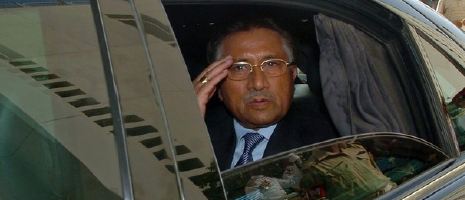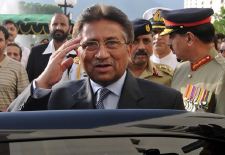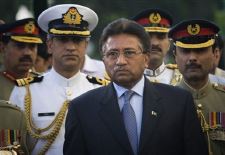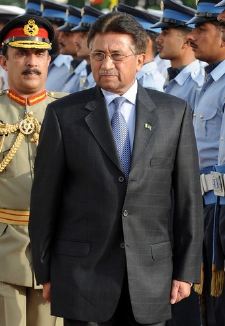Adil Najam
In a nationally televised speech, Gen. Pervez Musharraf, President of Pakistan, has just announced his resignation, pre-empting a move to impeach him by the parliament.
This post has been updated to add news photos from this momentous day in Pakistan’s political history. The pictures speak eloquently of the moods and thoughts of the day. (Scroll down to see the video of Gen. Musharraf’s resignation speech).
Participate in a poll on what might be Pakistan’s future post-Musharraf, here.
![]()
Here is a Pervez Musharraf time-line, published in The News:
August 1943: Born in Delhi, India
1964: Joins Pakistani army.
1998: Becomes army chief of staff.
October 1999: Seizes power in a bloodless military coup, overthrowing the prime minister, Nawaz Sharif. In response, the Commonwealth suspends Pakistan’s membership.
June 20 2001: Makes himself president, replacing Rafiq Tarar, while remaining head of the army. Tarar is forced out of office when the parliament that elected him is dissolved.
July 2001: Holds first meeting with the Indian prime minister, Atal Bihari Vajpayee, at Agra in India. No progress is made because of differences over the disputed territory of Kashmir.
September 2001: George Bush courts Musharraf, asking him to join him in his “war on terror” and help defeat the Taliban in neighbouring Afghanistan. The US president promises Pakistan $1bn in aid.
April 2002: Wins a referendum giving him another five years in office. Observers criticise the referendum as blighted by irregularities.
May 2002: Pakistan test fires three medium-range surface-to-surface missiles capable of carrying nuclear warheads. Musharraf insists his country would not be the one to initiate war.
August 2002: Consolidates his power still further, giving himself the right to dismiss an elected parliament.
October 2002: Pakistan’s first general election since Musharraf seized power in 1999 results in a hung parliament.
November 2002: Mir Zafarullah Jamali becomes the first civilian prime minister since 1999. He is a member of a Musharraf-supporting party.
November 2003: Pakistan’s National Assembly meets for the first time since 1999.
December 2003: Musharraf promises to step down as head of the army by January 2005.
May 2004: Pakistan is readmitted to the Commonwealth.
December 2004: Musharraf announces he will stay on as head of the army.
August 2005: Pakistan tests its first nuclear-capable cruise missile.
March 2007: Musharraf suspends the chief justice, Iftakar Mohammed Chaudhry, triggering a wave of anger across the country and the first joint protests held by the parties of exiled former prime ministers Benazir Bhutto and Nawaz Sharif.
October 2007: Signs a corruption amnesty, opening the way for Bhutto’s return and a possible power-sharing agreement. Within hours of Bhutto’s arrival back in the country, bombers attack a Bhutto rally in Karachi, killing more than 100 people.
November 2007: Declares a state of emergency, rounding up opposition leaders at gunpoint. In the same month, Musharraf quits as head of the army, becoming a civilian president.
December 15 2007: Lifts state of emergency and announces plans to go ahead with parliamentary elections scheduled for January 8.
December 27 2007: Benazir Bhutto is assassinated at an election rally in Rawalpindi.
January 2008: Elections postponed until February 18.
February 2008: The two main opposition parties gain a clear majority in the elections.
August 2008: The two main parties strike a deal to impeach Musharraf if parliament backs the move.
August 18 2008: Musharraf announces his resignation



























































People wanted democracy so here it is, with the two beloved politicians Mr 10% and Liar(Nawaz). Their parties have twice ruled Pakistan in democratic way and they both bankrupted Pakistan or killed opposition or set them up in false cases and manipulated the system.
Pakistan is now doomed
This is a very balanced and thought-out piece on Musharraf’s legacy, in DAWN.
———
Musharraf
I was just going through our beloved patriot dictators list of achievements since he came into power.
Found an interesting fact:
> Declares a state of emergency, rounding up opposition leaders at gunpoint.
What a wonderful democracy the general made.
God Bless Musharraf
I feel proud as a Pakistani today because for the first time people power and democracy removed a dictator through votes in the four provincial assemblies. No shots first, no one killed, no one arrested, no coup, no violence on the streets. All we did was to tell the tyrant that the people of Paksitan will no longer tolerate his lust for power.
This is the difference between those like Musharraf who snatch power through violence and treason an breaking the constitution and those who believe in democracy and the constitutional way.
The real winner here is Pakistan, democracy and Pakistanis and the rule of law and constitution.
Congratulations, Pakistan.
> Well I got news for you, its democracy in Pakistan now thanks
Democracy democracy democracy. Do Musharraf supporters even know what it means? Some say that they would prefer a “democratic dicatator” (whatever the *bleep* that is), others would prefer an outright dictator and others act like he was some godsent messiah who overthrew the democratic government of Pakistan and made it heaven on Earth.
So, why is it that Musharraf’s supporters claim that there was democracy in Pakistan? There was no free press, there was no accountability for his crimes and corruptions, and he removed the judges and judiciary at his will, instead instating his own cronies. Musharraf literally SOLD Pakistan civilians to America for cash. All of these points go virtually ignored by his supporters as if they never happened. And yet they go on to talk about a democratic Pakistan. Unless we learn from history we are doomed to repeat it! Please don’t ignore the facts and accept it! I have nothing against Musharraf personally, he is just another crook who looted the Pakistanis – the only difference is that this time it is much worse for Pakistan to get back on track.